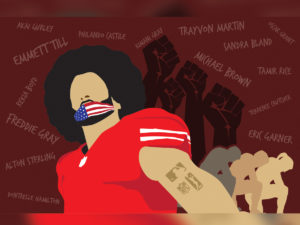
The country’s attention has once again returned its focus to the act of taking a knee during the national anthem after President Donald Trump’s comments during a rally for Alabama Senate candidate Luther Strange on Friday, Sept. 22. The president asserted that NFL players who “disrespect” the flag by kneeling during the national anthem ought to be “fired” — a statement that drew applause from those in attendance, but immediate backlash from professional athletes across all sports as several players across the NFL, the Women’s National Basketball Association and high school sports knelt, locked arms or raised their fists during the national anthem before their games in response. Couple this outburst with Trump’s withdrawal of NBA star Stephen Curry’s pre-declined White House invitation and his actions serve as the largest example of widespread efforts to misdirect former 49ers quarterback Colin Kaepernick’s original message against America’s racial oppression.
There is nothing even remotely new about American athletes using their sport’s platform to spread a political message to an audience that might not hear it otherwise. Athletics has always been intertwined with the cultural and political climates of the time, evidenced plainly (but not exclusively) by the long history of integration within American sports. What makes this particular wave of protest worrying is how Trump himself, who is supposed to represent all of America’s citizens, has railed against these athletes for protesting quietly and peacefully against police brutality and systemic racial injustices — all because those who have knelt aren’t, in his view, showing respect to the American flag.
It hardly matters that Trump cannot actually have these, in his words, “sons of bitches” fired. The widespread response to his statements, whether by the many teams and players that have taken up Kaepernick’s gesture, or by those who are now debating the anthem’s actual purpose and message and whether the protest is acceptable, demonstrate this issue as another crack exposing America’s crumbling social cohesion.
Kaepernick’s original message last year, that he was “not going to stand up to show pride in a flag for a country that oppresses black people and people of color,” was always bound to be diluted, even before Trump got involved last week. When Kaepernick began sitting on the bench during the anthem last season, few seemed to notice, until he began to kneel, and drew much criticism for it. He decided to take a knee, rather than sit, after a discussion with former Green Beret and Seahawks long snapper Nate Boyer, who suggested the gesture as a “middle ground” that evoked the image of a soldier kneeling in front of a “fallen brother’s grave.” But despite Kaepernick’s attempt to make his protest more palatable, the focus congealed around free speech and whether the gesture was respectful; Kaepernick’s point was and continues to be lost in favor of an argument about paying proper respect to the country, the flag, the military, the anthem and so on.
Now that Trump has stirred up more controversy, that argument has returned to the forefront, and those who first vilified Kaepernick’s initial demonstrations have been empowered by the president backing their beliefs. But why else focus on the flag? Quite simply, it makes for an easier discussion to have. A semantic argument about what the flag means to you can be comfortably won. Comparatively, debating about racial injustice in America is daunting.
There is also a certain short-sightedness in belittling the discussion to whether one should stand or if a protest during the anthem is “un-American.” The president himself is using these protests as political fodder; not only did he make his remarks to drum up hype for Luther Strange’s latest political bid (who, despite the support, lost the primary to Stephen Bannon’s pick, Roy Moore), but also they have served to distract the media’s and public’s attention from issues such as North Korea, or the rescinding of DACA and Obama-era Title IX protections.
Athletes are once again “getting political,” but their protests are now seen as targeted against the president who floated the idea of them being fired for exercising First Amendment rights, rather than racial injustice. Many fans view these protests as unproductive or downright hypocritical, leaving them dissatisfied and the NFL’s ratings plummeting. This perception may stem from the long-standing idea that sports and politics are separate, and that the role of sport is merely to entertain. That is far from the truth, not only due to the history of who has been allowed to play what sport and in what leagues, but also considering that the national anthem (or at least, its first half) is sung at the beginning of games to stir up patriotic spirit. Thus, as shown through this renewed debate, perhaps it is erroneous to suggest that an athlete can “get political” in the first place — sports always have been and will be a politicized matter.
Make no mistake: This clash over protests during the national anthem is not going to further productive discussions about police brutality or racial oppression. Instead, Trump has turned this into another rift between Americans, further exacerbating racial tensions not long after implying a wink-and-a-nod relationship with white nationalists.
Once again, we are getting distracted from the deeply rooted realities of this country — this time, by discussions of whether a protest at a sports game does or doesn’t show respect to the American flag. As a result, these athletes’ protests, originally intended to raise awareness to the problems that millions of Americans of color face every single day, have been turned into another avenue for the country’s racial turmoil to play out, without leading to a real, tangible improvement. It is easy to fall into a binary debate about the flag’s meaning, but the necessary discussion is on systemic racism — the larger issue being swept further beneath America’s fabric.








